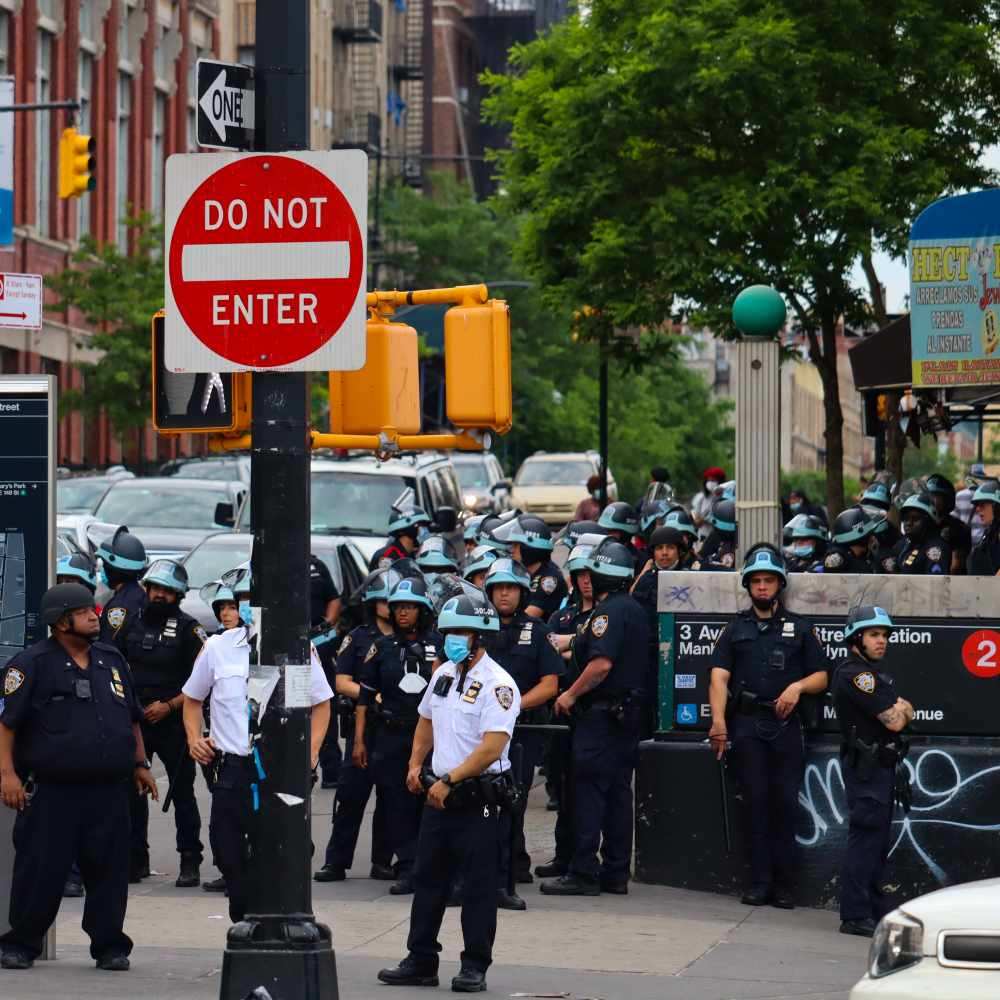NYPD overreach reveals lack of police accountability, Human Rights Watch alleges
A new report by Human Rights Watch concludes that the NYPD overstepped its authority at a June 4 peaceful protest in Mott Haven, using an 8 p.m. curfew imposed by Mayor Bill de Blasio as an excuse to block off streets protesters would have accessed to disperse, then corralling, beating and pepper spraying them, and arresting more than 200.
The 99-page report, “‘Kettling’ Protesters in the Bronx: Systemic Police Brutality and Its Costs in the United States,” concludes that many of the protesters were taken to the 40th and 41st precinct station houses, and to courthouses in Queens and Brooklyn for processing and detained in cramped cells for hours during the height of the COVID-19 pandemic, had lost their masks in the melee, leaving them exposed to possible coronavirus infection from other jailed protesters and unmasked officers.
In addition, the report alleges that police prevented medics with red cross insignia from treating the injured at the scene of the protest, and roughed up legal observers who were in Mott Haven to monitor the protest, and who had been granted essential worker status by mayoral decree.
On June 4, about 300 people responded to Bronx grassroots groups call to assemble in the Hub in Mott Haven to protest police brutality, following the killing of a Black man, George Floyd, in Minneapolis a week earlier by a white police officer. The organizing groups included Longwood-based Take Back the Bronx, Bronxites for NYPD Accountability, and Decolonize This Place, who dubbed the protest FTP4, after other FTP protests around the city. The term FTP can stand for either Fuck the Police or Feed the People.
The report recounts that the protest began at around 7 p.m. with activists informing the crowd about the difficulties South Bronx residents regularly confront, including chronic poverty and limited access to health care during COVID. The activists then led the group down Willis Avenue to 136th Street, where about 50 police officers on bicycles blocked them before dozens more officers closed in from behind, just a few minutes before the 8 p.m.curfew.
“The New York City police blocked people from leaving before the curfew and then used the curfew as an excuse to beat, abuse, and arrest people who were protesting peacefully,” said Ida Sawyer, acting crisis and conflict director at Human Rights Watch and co-author of the report. “It was a planned operation with no justification that could cost New York taxpayers millions of dollars.”
Human Rights Watch rebuked NYPD Commissioner Dermot Shea’s statement at a June 5 press briefing that the protest was an attempt by “outside agitators” to “cause mayhem,” and “injure cops.” Human Rights Watch says their investigation has turned up no evidence” in support of Shea’s claim.
They point out that Shea also said that police “had a plan which was executed nearly flawlessly in the Bronx,” indicating that police brass had intended to carry out the kettling all along, and, they say, curfew violation was an excuse to punish protesters.
NYPD responded to a request for comment from The Herald, with a statement saying “We take strong exception to the subjective characterization of our police actions to maintain public order as ‘an planned assault.'” (sic)
The police operation alone included two helicopters and about 100 officers, along with the arrest and processing of 263 protesters, but the report predicts that the biggest expense New York City taxpayers face “will likely come from the resulting misconduct complaints, investigations, and lawsuits,” including “at least 98 claims filed with the Comptroller’s Office since the protest.”
Human Rights Watch documented at least 61 cases of injuries to protesters, legal observers, and bystanders during the crackdown, including “lacerations, a broken nose, lost tooth, sprained shoulder, broken finger, black eyes, and potential nerve damage due to overly tight zip ties,” along with one who said that “somewhere in the process of being cuffed, I had a knee on my neck.” Numerous participants at the June 4 protest—many of whom had attended other protests— told the investigators and the Herald they have never seen a police response anywhere near as fierce as the one they witnessed that evening.
The report points out that “Mott Haven has long been aggressively overpoliced for low-level crimes, and more complaints about the use of physical force by police officers have been made in Mott Haven’s 40th precinct than in any of New York City’s other 76 precincts.”
According to data from the Civilian Complaint Review Board, the 40th Precinct has received the third highest number of civilian complaints about police misconduct, and the most complaints for police use of physical force, of all NYPD precincts since 2015, but that officers are almost never disciplined for abuses due to toothless oversight mechanisms and powerful police unions.
The report proposes four key steps to reform policing based on observations from NYPD’s intervention in the June 4 protest:
1. Dramatically decrease the size and budget of the NYPD, and reduce the role of police in addressing societal problems and the funding allocated to police, while increasing community oversight of the NYPD’s budget.
2. Invest more in community-based solutions to societal issues such as substance use disorders, homelessness, and poverty, access to education, health care, and mental health support.
3. Bolster independent accountability and oversight mechanisms for NYPD.
4. Involve communities in selecting the NYPD Commissioner, and in holding officers accountable for abuses.
The protesters who were charged face misdemeanor charges for curfew violations or unlawful assembly, and were given summonses or desk appearance tickets with court dates for Oct. 2. However, earlier this month Bronx DA Darcel Clark filed to dismiss the summonses, and informed Human Rights Watch that the desk appearance tickets will also be dismissed.

